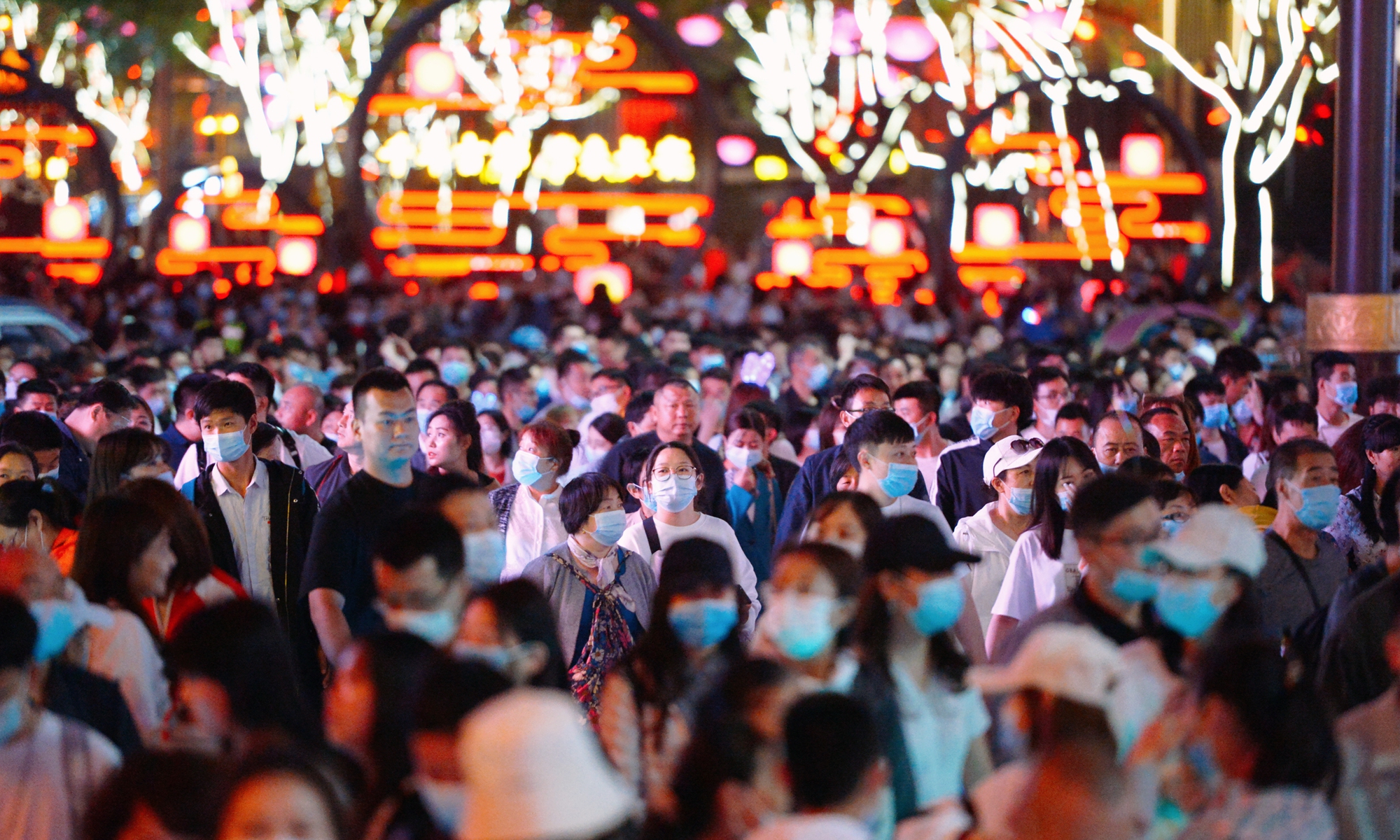May Day travel rush points to booming tourism, management issues
Solid recovery offers huge opportunity, but services need upgrade

Crowds flock to a night market in Xi'an, Northwest China's Shaanxi Province, on Tuesday. Photo: VCG
The May Day holiday in China has seen the biggest travel rush since the outbreak of the COVID-19 pandemic, but as hundreds of millions of travelers hit the road and tried to enjoy beautiful sceneries across the country, many also faced headaches.
In Central China's Hubei Province, some visitors demanded refund after waiting hours to just enter a theme park. In Central China's Henan Province, a hailstorm also caused serious disruptions for visitors. Across the nation, widespread flight cancellations and delays on train services were also reported.
As the COVID-19 pandemic has been curtailed in China, allowing for the free movement of people, the domestic tourism sector is seeing a booming period, with international travel still restricted due to the pandemic. However, the tourism boom also highlighted a series of management issues in the domestic industry - from tourist spots to transportation systems, analysts noted.
According to media reports, at a theme park in Jingzhou, Hubei, many visitors had to wait four hours to enter the park on Sunday due to the crowds, and many of them requested refunds. The management team confirmed the situation and has since issued refunds.
On the same day, many visitors at the Yuntaishan scenic spot in Jiaozuo, Henan, also asked for refunds as the spot was suddenly hit by a hailstorm that led to heavy traffic jams. The spot's official account on social media Sina Weibo later offered an apology, saying that they were not well-prepared for the emergency.
"These incidents unveil the poor management of many scenic spots in China in many aspects, such as emergency response planning," Yang Jinsong, a senior researcher at the China Tourism Academy, told the Global Times on Wednesday.
Vast market potential
As the pandemic situation in China has been contained, demand in the tourism sector that had previously been restrained over the winter due to epidemic prevention rules is being largely released, data from Chinese tourism agencies showed.
According to online travel agency Fliggy, the booking of tickets to scenic spots on its platform has seen a 420 percent increase during the May Day holiday compared with the same period last year, while the booking of hotels increased 200 percent year-on-year.
According to qunar.com, another online travel agency in China, booking data from many sectors has reached record highs due to the strong demand. The booking of air tickets, for example, increased 30 percent compared to the same period in 2019 before the pandemic.
The surging demand, along with the international travel ban that has forced tourists who want to travel overseas to find alternatives in domestic spots, has provided vast opportunities for domestic tourism service providers, including scenic spots and hotels, Yang said.
"However, they must improve management systems if they want to seize the opportunities." Yang noted.
Improvements needed
From improving booking systems, to introducing smart visitor guidance, to diversifying services, Yang believes that there are many areas that need to be upgraded to meet the increasing demand.
"If they [management teams] have adequately estimated the number of visitors and made emergency plans, the capacity of these scenic spots is enough to meet domestic demand," Yang said, adding that they need to upgrade their reservation systems to allow visitors to enter the spots at different times in order to avoid peak hours.
In addition, smart visitor guidance systems, which could indicate the traffic volume in a scenic spot and guide visitors to low-traffic-volume areas to avoid crowds, which is known as part of the delicacy management, should be introduced as it is technically feasible today, Yang added.
Furthermore, tourism providers, especially those of tourist sites, should diversify their services to meet diversified needs, instead of only providing a ticket, according to Yang.
Tourists are no longer satisfied by only entering scenic spots; the need for a multidimensional experience in a spot, including the demand for high-quality food, should also be met, which could increase the income for scenic sites, Yang said, adding that "for example, these spots could introduce variety shows and local specialties."
While the service providers should improve their management, market regulators also play an important role in guiding and supervising the development of the tourism sector, media reported.
"Facing the increasing demand for tourism, market regulators should think differently to explore new developing models for the tourism sector, such as developing and integrating small scenic spots to relieve the traffic of top scenic spots," suggested a commentary published by the bjnews.com.
"Market regulators have started to guide service providers to extend business models. However, there is still some room to improve, such as by promoting smart tourism by using the existing technologies including 5G, Internet of Things and big data," Yang said.
"By using new technologies, government can develop a smart management system that can monitor the real-time traffic system," Yang said.
As the application of big data is quite mature in China, the technology could also be used in the system to accurately forecast traffic volumes to arrange staff schedules, and even forecast how much food a scenic spot should prepare for an upcoming holiday, analysts said.

